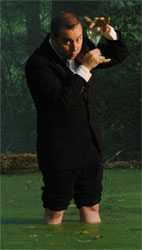|
Interview with Tim Fite by Nikki O’Neill
 He’s got slow fingers and low budgets. But instead of being hampered and silenced by these constrictions, he made them shape his sound - a unique and quirky mix of folk, twang and hip-hop, that caused critics to hail him as “2007’s most relevant,” and Les Claypool to bring him out on the road. OnlineRock met Tim Fite to get the scoop on his brand new album “Fair Ain’t Fair” and those one-dollar CD samples… He’s got slow fingers and low budgets. But instead of being hampered and silenced by these constrictions, he made them shape his sound - a unique and quirky mix of folk, twang and hip-hop, that caused critics to hail him as “2007’s most relevant,” and Les Claypool to bring him out on the road. OnlineRock met Tim Fite to get the scoop on his brand new album “Fair Ain’t Fair” and those one-dollar CD samples…
Maybe Citizen Cope’s hip hop-folk was too glossy for you. And Beck, well, he rose above the slacker generation and turned into a distant supernova. But if you’re still longing for somebody to represent some raw, down-home, urban beat folkiness, lend your ears to Tim Fite.
The Brooklyn-based multi-media artist first created a buzz during the early 2000s in the hip hop duo Little-T and One Track Mike with the MTV hit “Shaniqua.” As the group went on hiatus, ANTI Records signed him as a solo artist, and he released “Gone Ain’t Gone” – a genre-defying work that shows off his individualist ways of combining samples from cheap, long-forgotten records with the imprints of real, breathing musicians. Next, he released the free, web-only, full-length “Over The Counter Culture” in 2007. A sharp critique of modern consumerism, it became hailed by several music critics as one of the most relevant album of the year.
This month, he releases “Fair Ain’t Fair”, the much-anticipated follow-up to “Gone Ain’t Gone.” The signature samples are there, and so is his critical stance – the theme of the album is “apocalypse” and the idea of humanity having to reap what we sow. But many of the songs are surprisingly melodic and catchy, filled with layers of sweet vocal harmonies that give you high hopes for humanity after all.
How would you consider "Fair Ain't Fair" being a follow-up to "Gone Ain't Gone?” What's the connection between the two?
- Fair Ain't Fair (FAF) is the natural follow-up to "Gone Ain't Gone" (GAG) on multiple levels. Sonically, there were a lot of things that I was tinkering with on GAG that I didn't quite get satisfied by. I worked on those for FAF, thinking about disparate ranges of dynamics, and how notes work with and against each other to build and release tension.
- Conceptually “Fair Ain’t Fair” follows “Gone Ain’t Gone” because GAG is about crime vs. crime, and FAF is about punishment vs. punishment.
How did you record the album?
- I did it in three places: my house, my high school, and my parents’ barn. I record digitally, but much of the material that I steal from sounds like it was recorded to tape. ProTools is my main tool, though I got help at the high school and barn from my friend Rob Badenoch, who uses Sony Vegas. He helped me record some of my friends - Justin Riddle, Dr. Leisure, Dan Kinsley, Pepi Ginsberg, Adam Gustavson to name a few - playing drums and guitars and banjos and mandolins and lions and chickadees and fireworks and tires.
How did you find the samples for this album? On "Gone Ain't Gone", you limited yourself to only picking samples from albums that wouldn't cost you more than a dollar...
- The “under-a-dollar” rule still stands for “Fair Ain’t Fair”, but this time I also included material that was on CD’s that I traded with friends in other bands. So, I got to use some music by the Constantines, East Ghost West Ghost, and Remate.
What makes you want to use samples in the first place?
- I have slow fingers and low budgets.
What do you have to do to clear the samples?
- I have to steal. I can't make the music I want to make other wise. So, I have to steal first and ask permission later. Generally when the only people involved are musicians, everything is smooth and easy. When business folks start waving numbers, that is when I step aside and cross my fingers. I have had to re-record before, but for “Fair Ain’t Fair”, I got 100% yes. Proof that you can make ice-cream out of ice-cream.
Once you've picked the samples you're interested in, how do you use them in your songwriting and recording process?
- Usually I cut out all the wordless parts of other people’s songs, and restructure them into a new song. Then I add my own elements. Sometimes I hardly add anything at all, just some words and a scraper. Other times, you can hardly recognize the source material.
Do you ever end up not using some samples that you've cleared for any reason?
- Yes, there is a song that I was going to put on FAF that we cleared, but it did not go on the record. I will probably just put it up on the Internet someday.
Les Claypool contacted you to join him on his tour, and you recently got off the road. Did you perform any of the songs off of "Fair Ain't Fair" at the shows?
- Yes, and I think that they went over well. His fans were splendid.
There are so many cool vocal layers on the songs, great background vocals everywhere. How much re-arranging of the songs did you have to do, since it’s only you and your brother performing on stage?
- Not so much, we have the Bloody Nose Boys and the gentleman with itchy legs up there on the screen to back us up.
Did playing larger venues affect your song set list or how you ended up performing the songs in any way?
- A little bit. We tweaked things along the way to streamline the beast.
Having a barricade was weird. Dr. Leisure (live DJ) and I like to be able to get to the audience easily, so we had to jump the fence on occasion.
Tell us about your current tour with Adam Green of The Moldy Peaches. How did you guys connect?
- I am looking forward to the shows with Adam. We have a common friend in Ben Kweller, and see each other whenever Ben has a gathering at his house.
You live in Brooklyn, NY. Name your 5 favorite things about your neighborhood.
1. The noise.
2. The bricks.
3. The smell.
4. The train.
5. The sidewalk.
When you released "Over The Counter Culture", that album included a critical view of today's bling culture and corporate hip hop. What kind of hip hop artists out there today do you like and respect?
- I like and respect the majority of hip hop - even much of the music that is caught in the system. Some stand out folks who are chiseling away at that system are The Coup, Devin The Dude, and Lupe Fiasco.
You're a multi-media artist, working with short films, video and illustrations as well as music. Do you do any exhibits, or is your website your main vehicle for getting your visual art seen? And how do you think your films and videos reinforce your music?
- I used to keep all the things I liked to do in separate boxes. There was the music box, the story box, and the picture box. These days, I only have one box. Right now music is at the top of the box, and you have to dig a little for the other things. Someday, that may change, depending on my knees.
Last question: What happened to your official site that had so many of your cool animations? Now the URL connects to your MySpace, and there’s none of that there...
- Timfite.com is under construction, but will be back soon with all kinds of new and improved electronic mysteries.
 Nikki O’Neill is a singer, songwriter and guitar player in Los Angeles. She’s the front person for the Nikki O’Neill Band, an original rock and soul band gigging frequently. Nikki O’Neill is a singer, songwriter and guitar player in Los Angeles. She’s the front person for the Nikki O’Neill Band, an original rock and soul band gigging frequently.
She’s the founder of Women’s School of Rock, teaching guitar, bass and songwriting. Her teaching brought her to Sweden as a guest teacher at an all-female rock college, and she taught the only university-level class in the U.S. on women’s contemporary rock and blues guitar at The New School in New York City.
Will Ray of The Hellecasters describes her as “Chrissie Hynde singing to John Lennon in Otis Redding’s kitchen.”
www.myspace.com/nikkioneillmusic
|